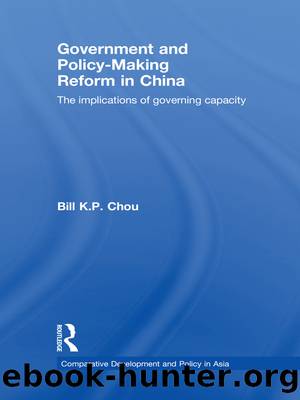Government and Policy-Making Reform in China: The Implications of Governing Capacity by Bill K. P. Chou

Author:Bill K. P. Chou [Chou, Bill K. P.]
Language: eng
Format: epub
Tags: Ethnic Studies, Social Science, Political Science, American Government, Regional Studies, General
ISBN: 9781134075423
Google: lYd9AgAAQBAJ
Goodreads: 17476607
Publisher: Routledge
Published: 2009-05-07T00:00:00+00:00
Reform of staff development
Performance appraisal and training are two major staff-development activities. A good performance appraisal can provide employees with regular feedback on their work and give them opportunities to correct their weaknesses. The feedback and opportunities are essential for raising employeesâ productivity and channelling their abilities and efforts to fit organisational expectations. Training is necessary to improve employeesâ work-related attitude, skills and knowledge. Good training programmes help employees to correct their weaknesses (Pynes 1997: 122; Dresang 1999: 181; Klingner and Nalbandian 1998: 275).
The performance-appraisal exercises in the past failed to give employees regular feedback on their performance. In 1989, the CCP decreed an annual mandatory appraisal, but the regular annual appraisal was an exception, not a rule. Only leading officials had to undergo performance appraisal; appraisals of non-leading officials were uncommon (Contemporary China Editorial Committee 1994: 369; China Personnel Yearbook Editorial Board 1991: 98). The laxity in performance-appraisal exercises was due to the exercisesâ potential to damage personal relationships (guanxi). Under the Chinese administrative hierarchy, the reporting line was vertical, and horizontal coordination among the different functional bureaucracies was insufficient. Information and directives across departments had to be conveyed through informal channels buttressed by personal relationships. Personal relationships could only be cultivated in a harmonious work environment in which people avoided the type of conflict that would potentially arise when discussing their colleaguesâ weaknesses. Hence many local leaders were reluctant to do performance-appraisal exercises (Fewsmith 1996; Takahara 1992: 88).
Another weakness of the past performance-appraisal system was that it prioritised political integrity rather than merits. The major purpose of the past performance-appraisal exercise was to spot âcorrupt cadresâ, not to improve cadresâ performance. A cadreâs political stance was the main determinant of his or her rise or fall. In addition, the past performance-appraisal system could neither differentiate between cadres of different performance levels, nor link the performance levels with rewards and disciplinary actions. Accordingly, appraisal activities could not effectively motivate cadres to work towards organisational missions (Harding 1981: 85â6; Lee 1991: 389; Contemporary China Editorial Committee 1994: 372â4).
The promulgation of the Provisional Regulations of State Civil Servant Appraisal in 1994 kicked off the performance-appraisal reform. Department directors were required to appraise all their department members at the end or beginning of every year. At the beginning of the appraisal exercises, departments had to set up appraisal commissions composed of representatives from management, labour side and personnel offices to oversee appraisal exercises. Department members were required to write personal reports of their work performance. Based on these personal reports and their own assessments, department directors rated civil servants according to a four-grade classification: excellent, satisfactory, basically satisfactory and unsatisfactory. In comparison to the three-grade classification adopted in 1993, the four-grade classification was believed to be better able to provide an accurate record of civil servantsâ performance levels and give them feedback. Appraisal grades are assigned on the basis of five performance areas: political credentials (de); ability (neng); diligence (qin); achievement (ji); and integrity (lian). The Law of Civil Servants did not clearly specify the performance areas.
Download
This site does not store any files on its server. We only index and link to content provided by other sites. Please contact the content providers to delete copyright contents if any and email us, we'll remove relevant links or contents immediately.
Zero to IPO: Over $1 Trillion of Actionable Advice from the World's Most Successful Entrepreneurs by Frederic Kerrest(4518)
Machine Learning at Scale with H2O by Gregory Keys | David Whiting(4292)
Never by Ken Follett(3937)
Harry Potter and the Goblet Of Fire by J.K. Rowling(3848)
Ogilvy on Advertising by David Ogilvy(3604)
Shadow of Night by Deborah Harkness(3359)
The Man Who Died Twice by Richard Osman(3072)
Book of Life by Deborah Harkness(2931)
The Tipping Point by Malcolm Gladwell(2914)
Will by Will Smith(2910)
0041152001443424520 .pdf by Unknown(2843)
Purple Hibiscus by Chimamanda Ngozi Adichie(2825)
My Brilliant Friend by Elena Ferrante(2824)
How Proust Can Change Your Life by Alain De Botton(2805)
How to Pay Zero Taxes, 2018 by Jeff A. Schnepper(2646)
Hooked: A Dark, Contemporary Romance (Never After Series) by Emily McIntire(2550)
Rationality by Steven Pinker(2352)
Can't Hurt Me: Master Your Mind and Defy the Odds - Clean Edition by David Goggins(2323)
Borders by unknow(2303)
